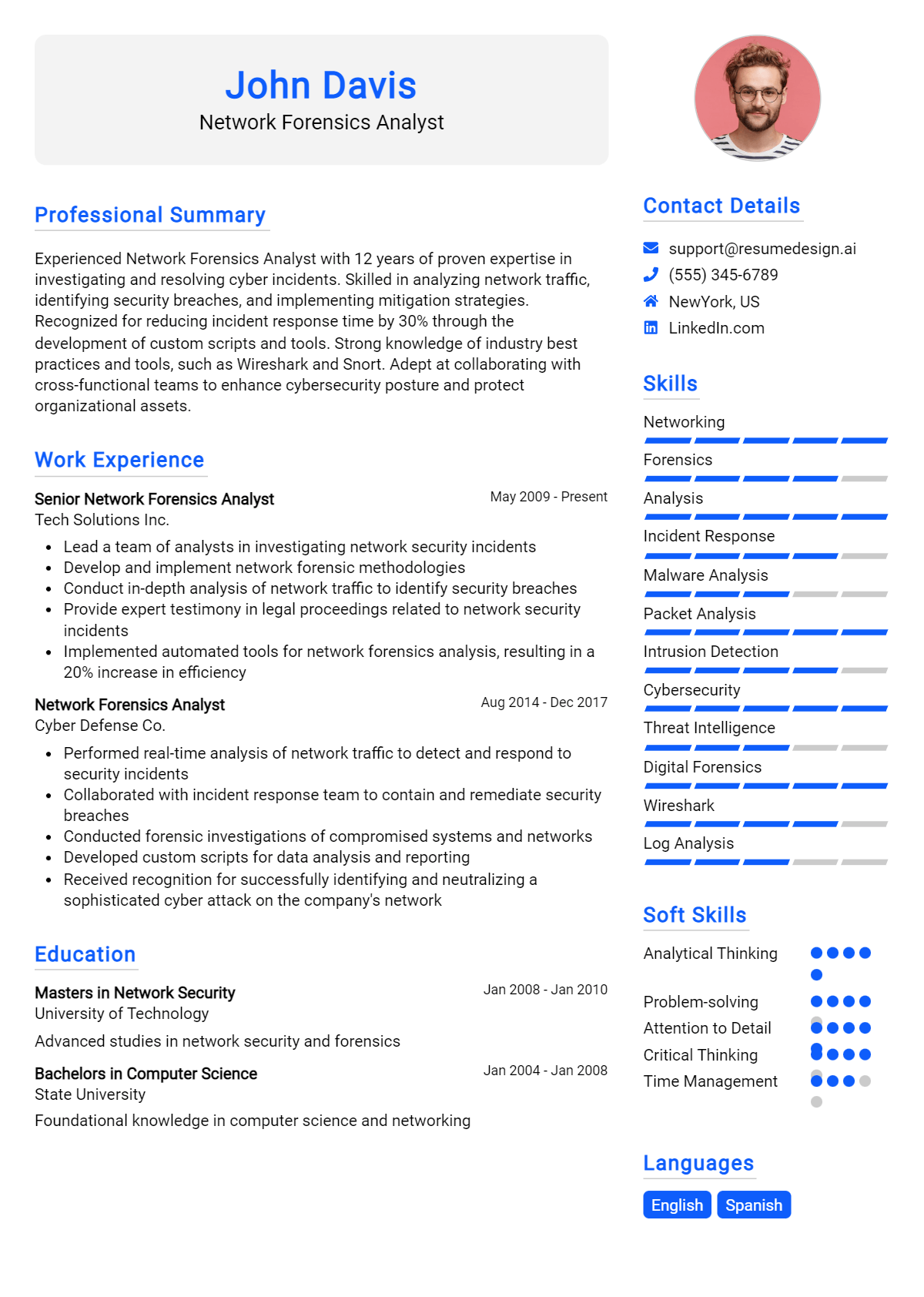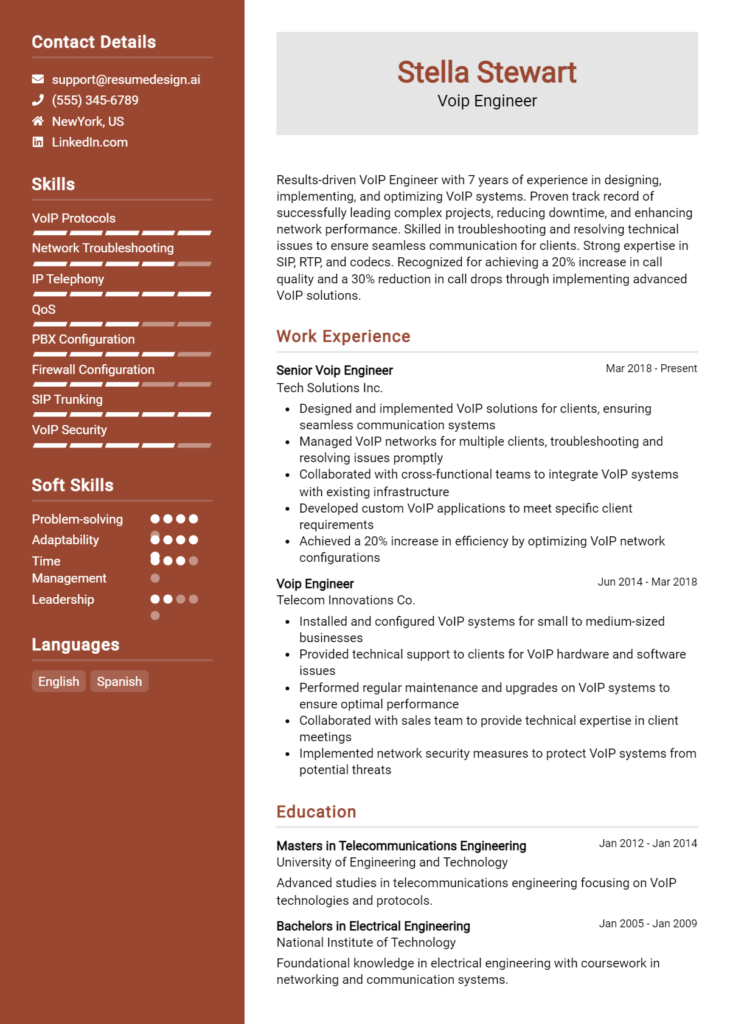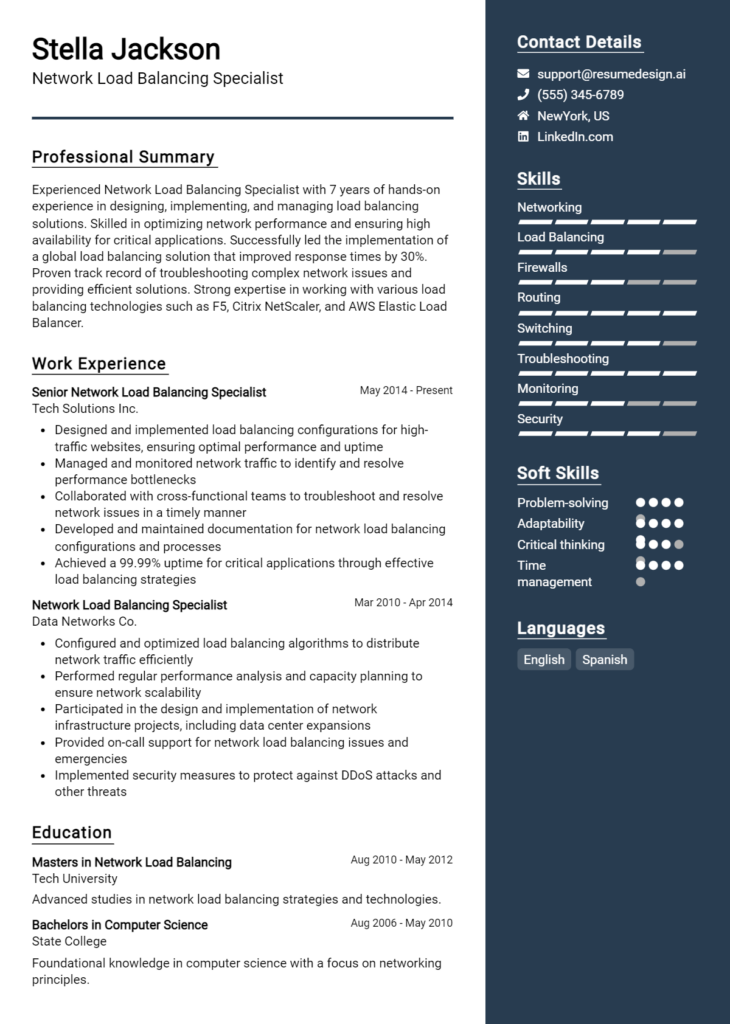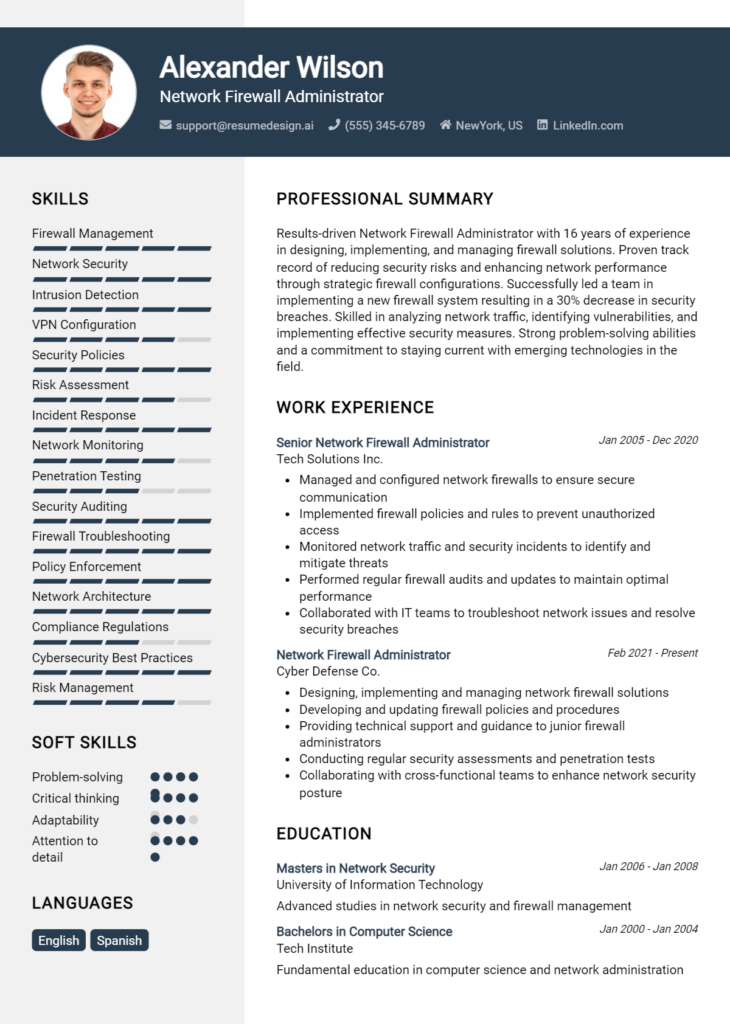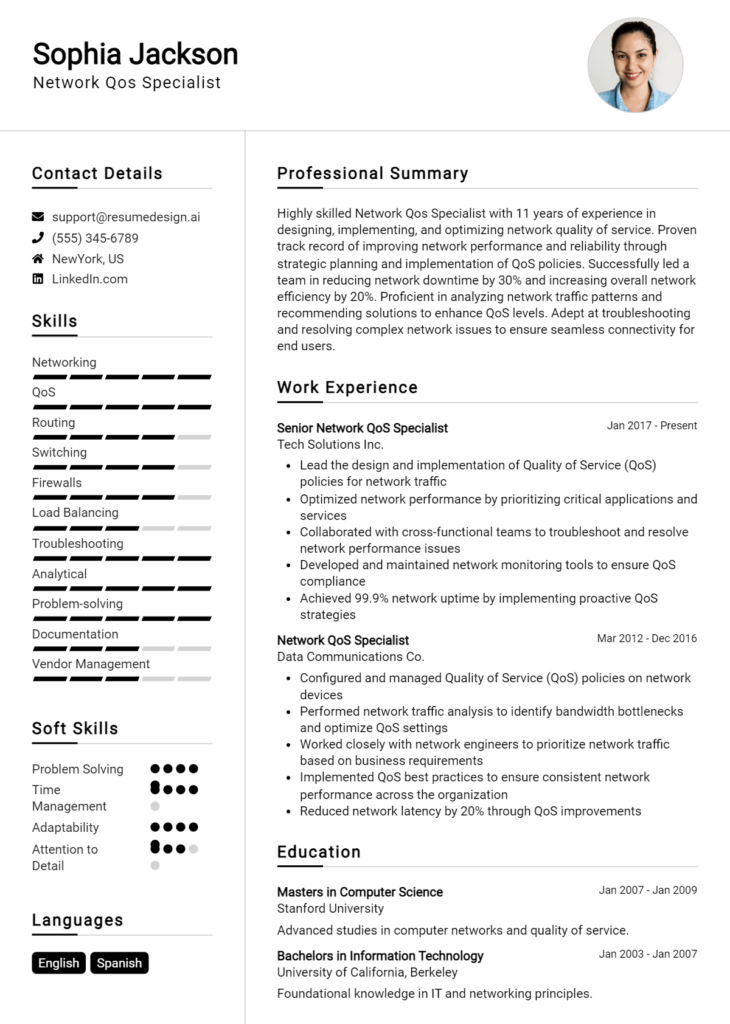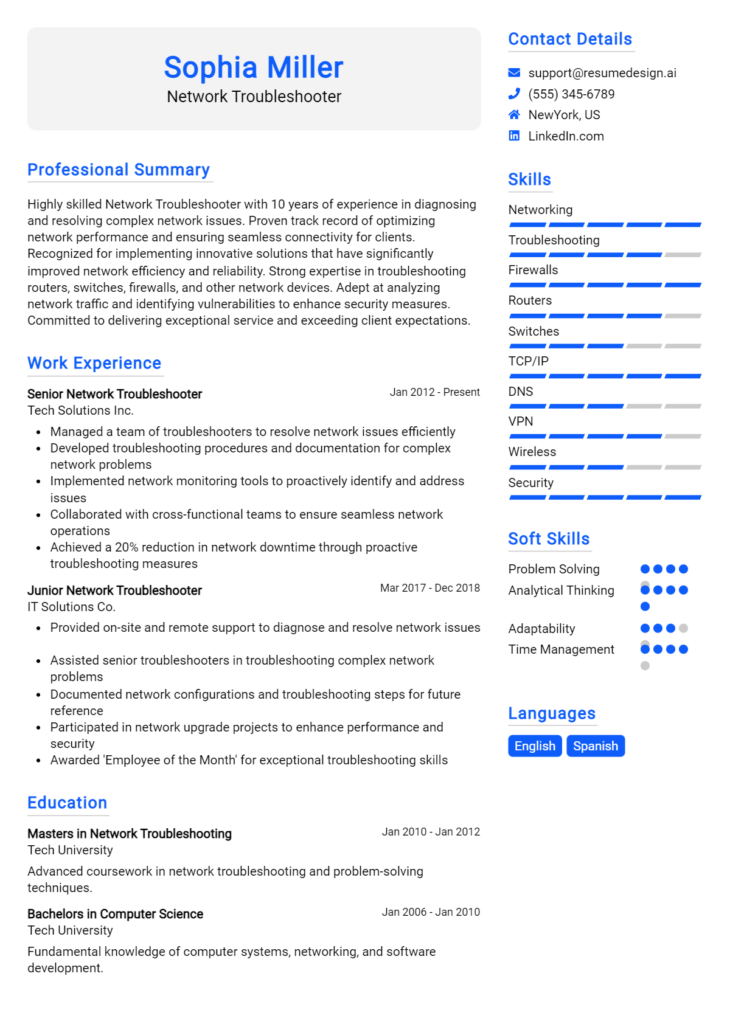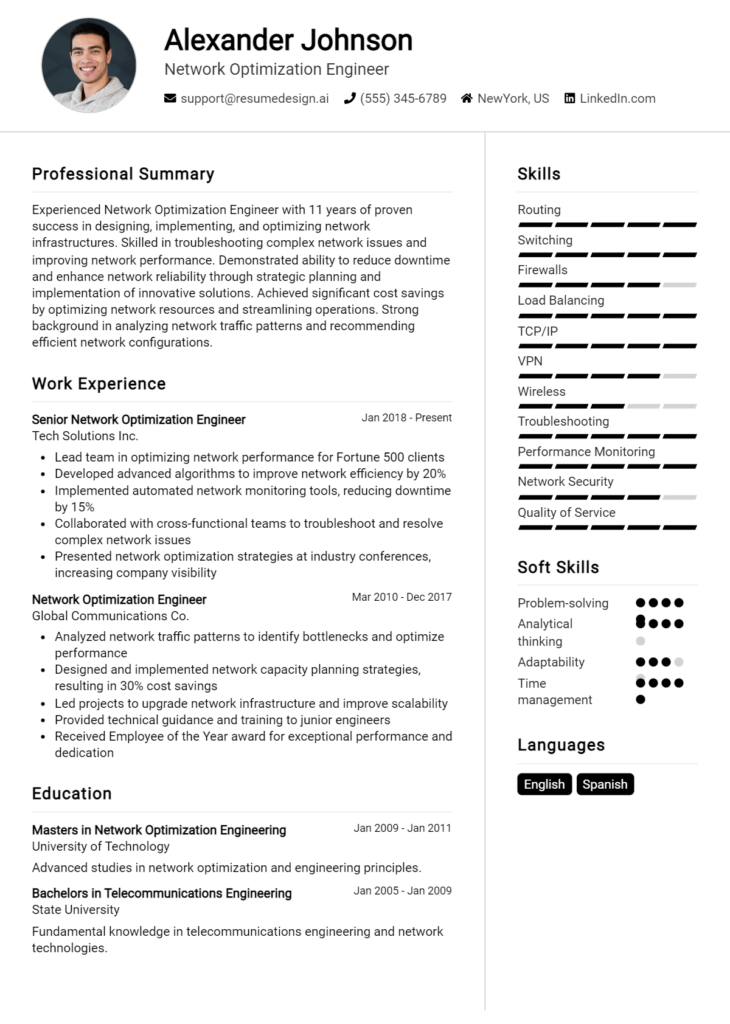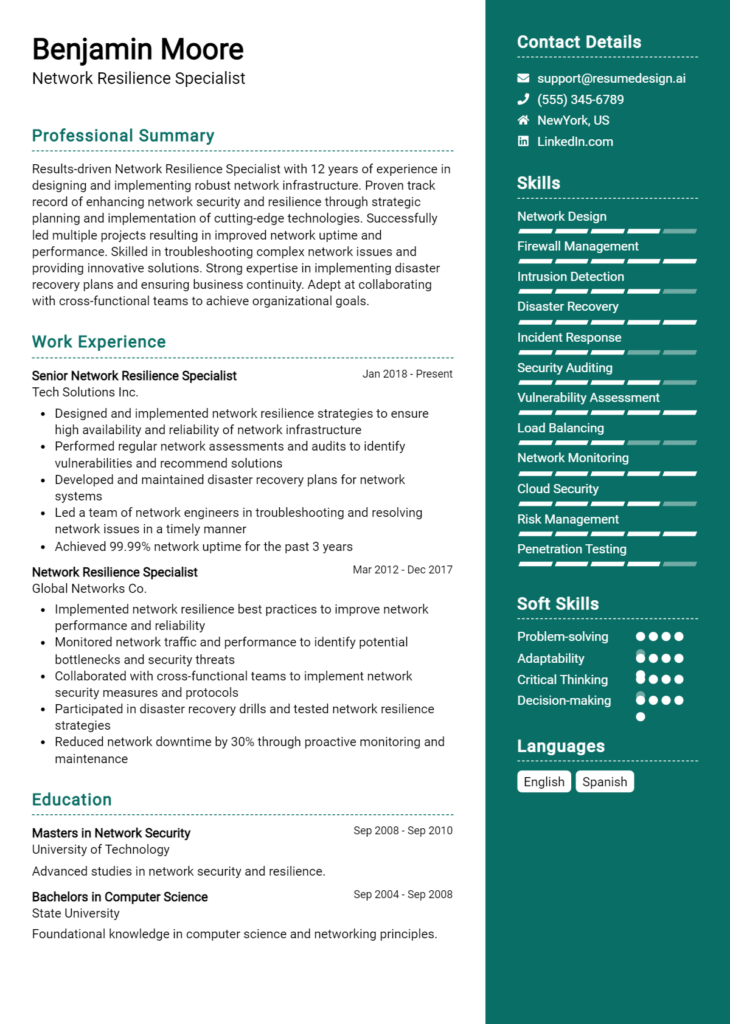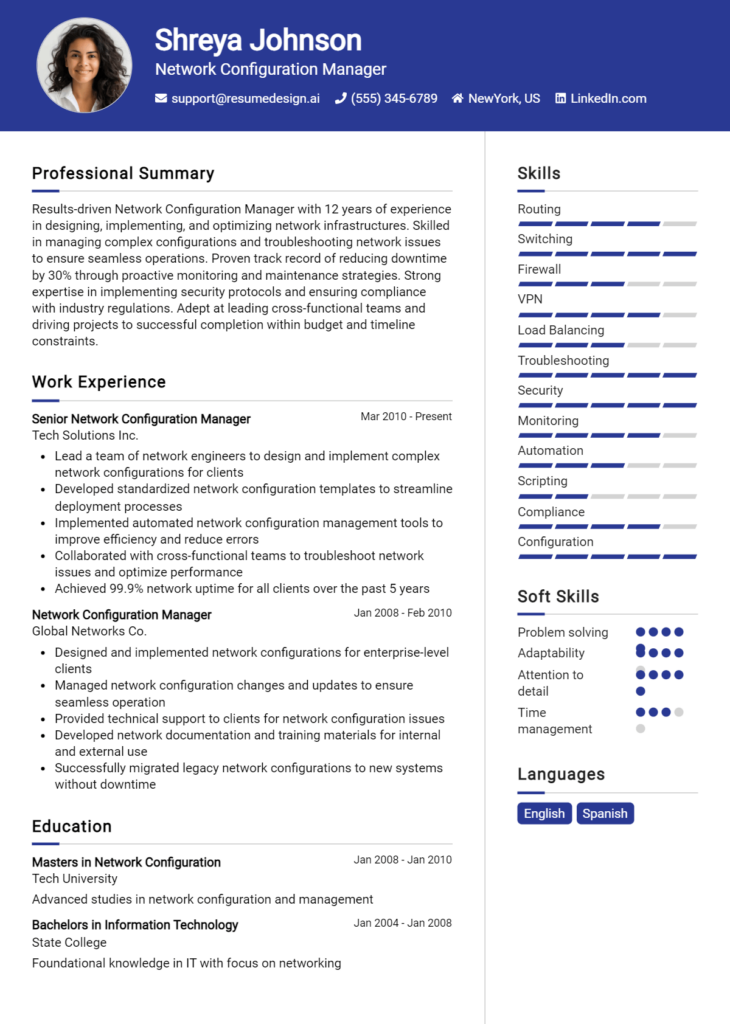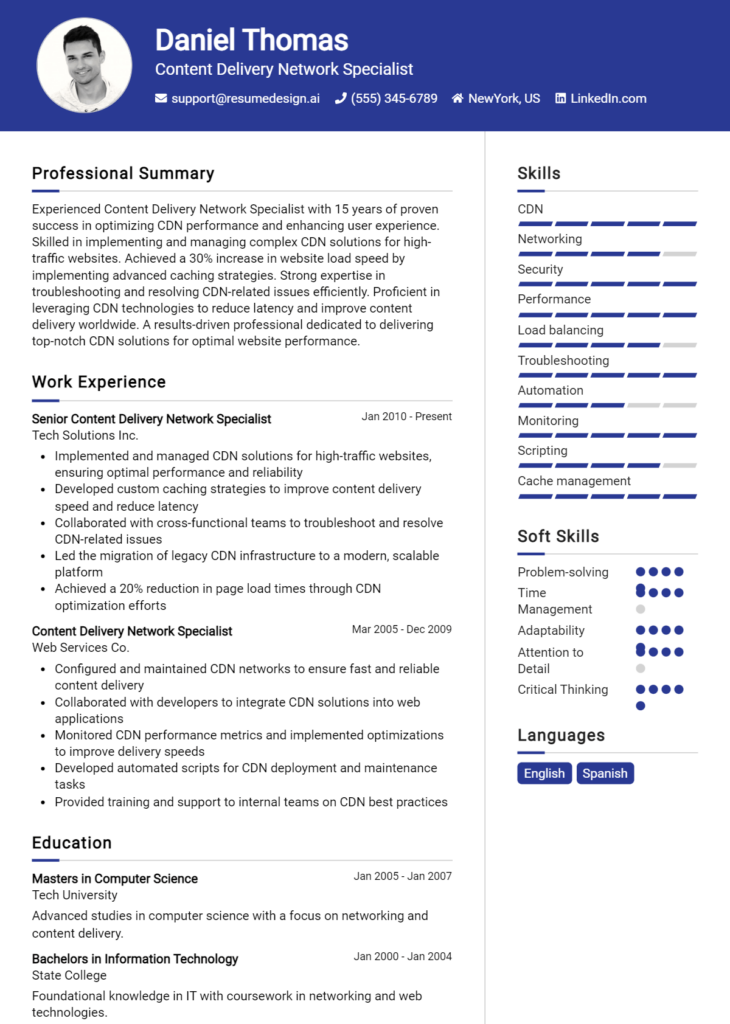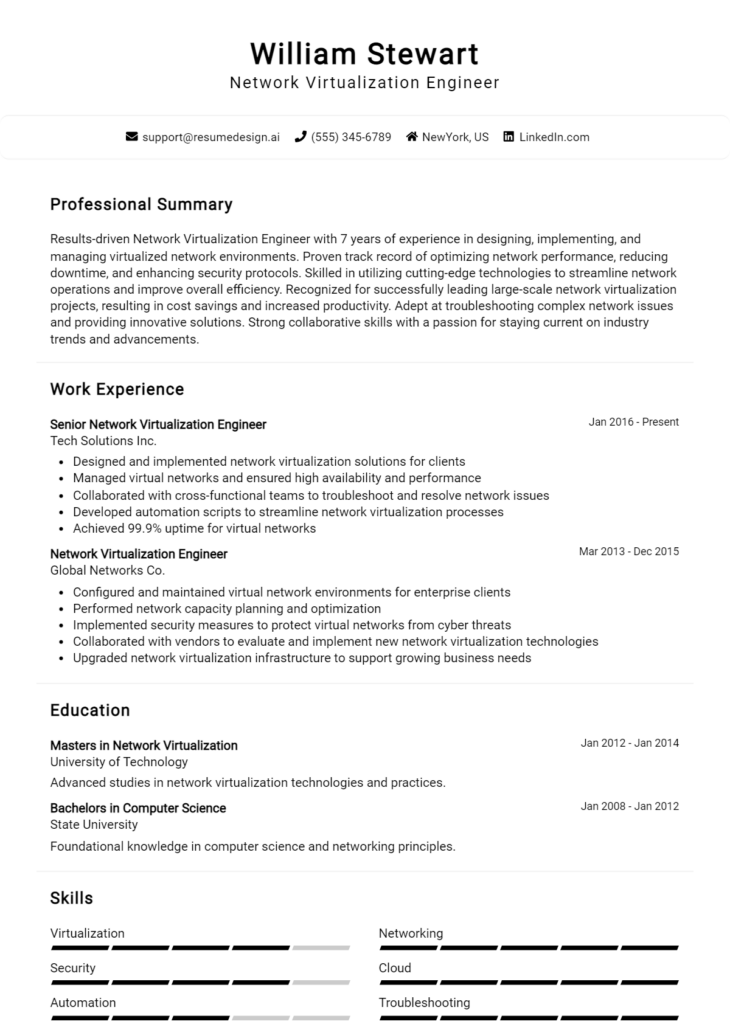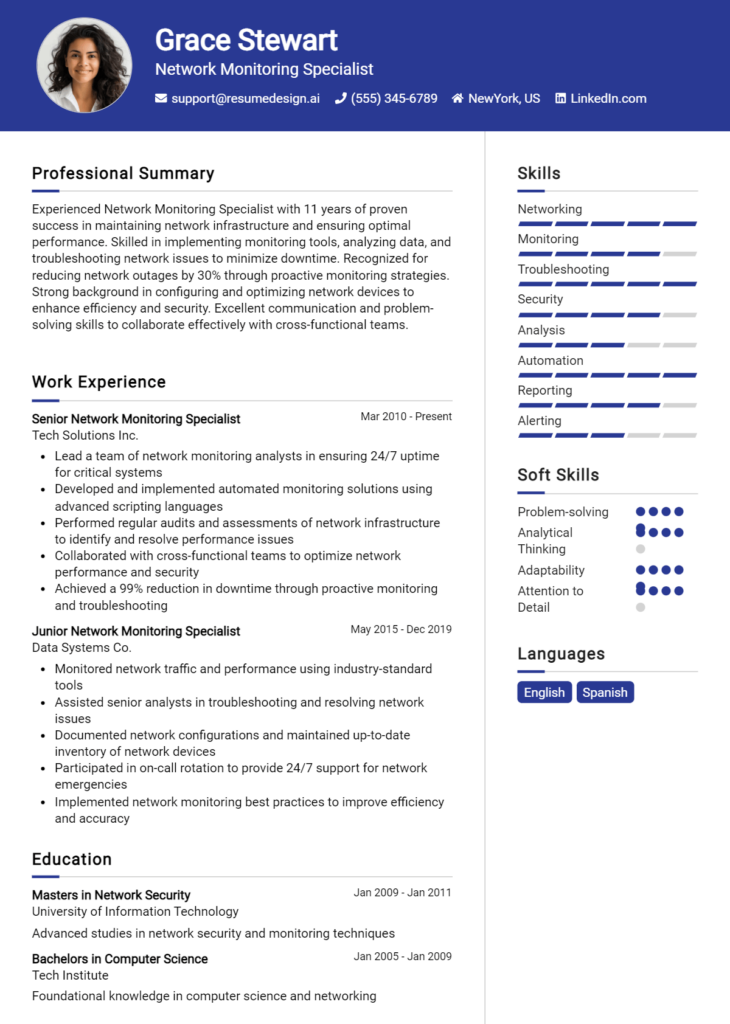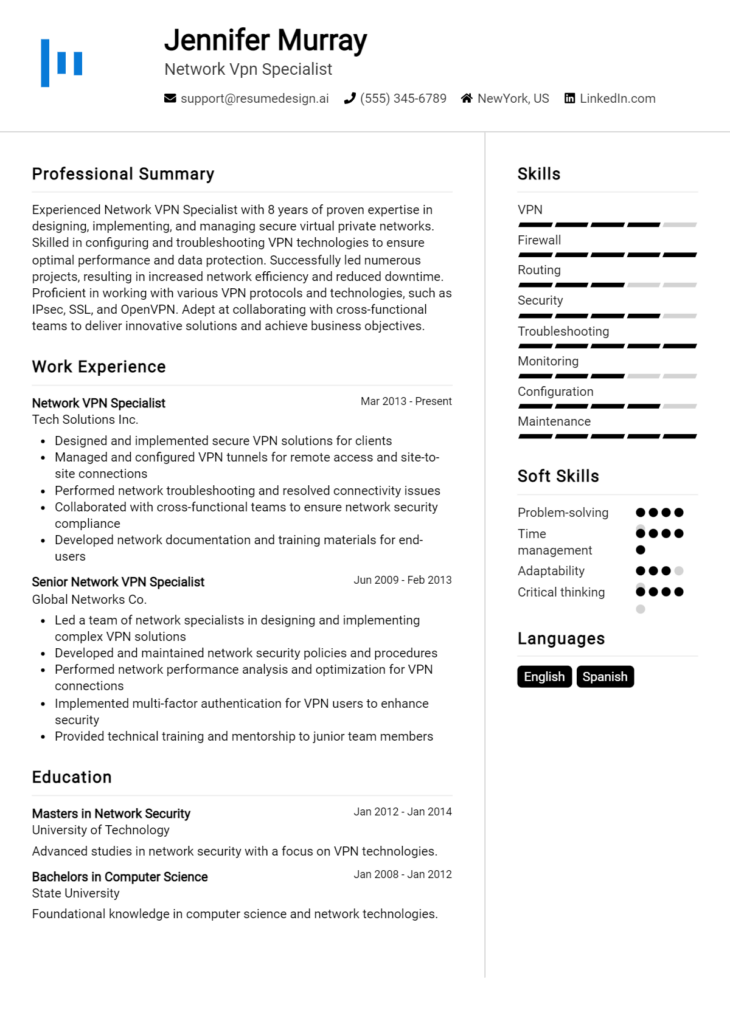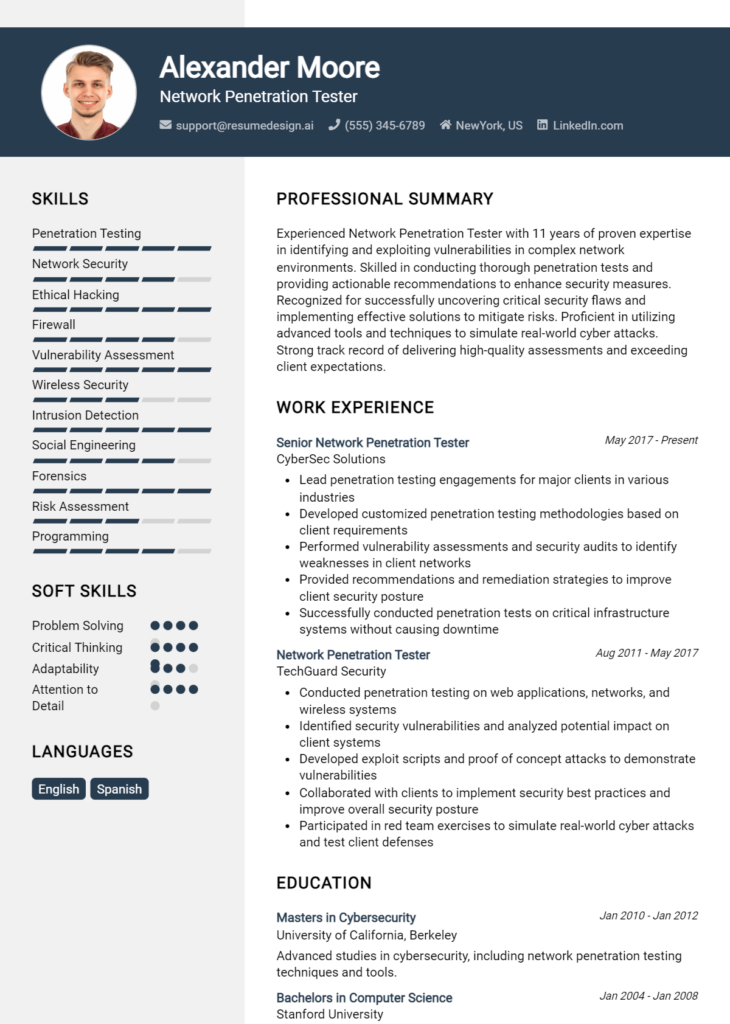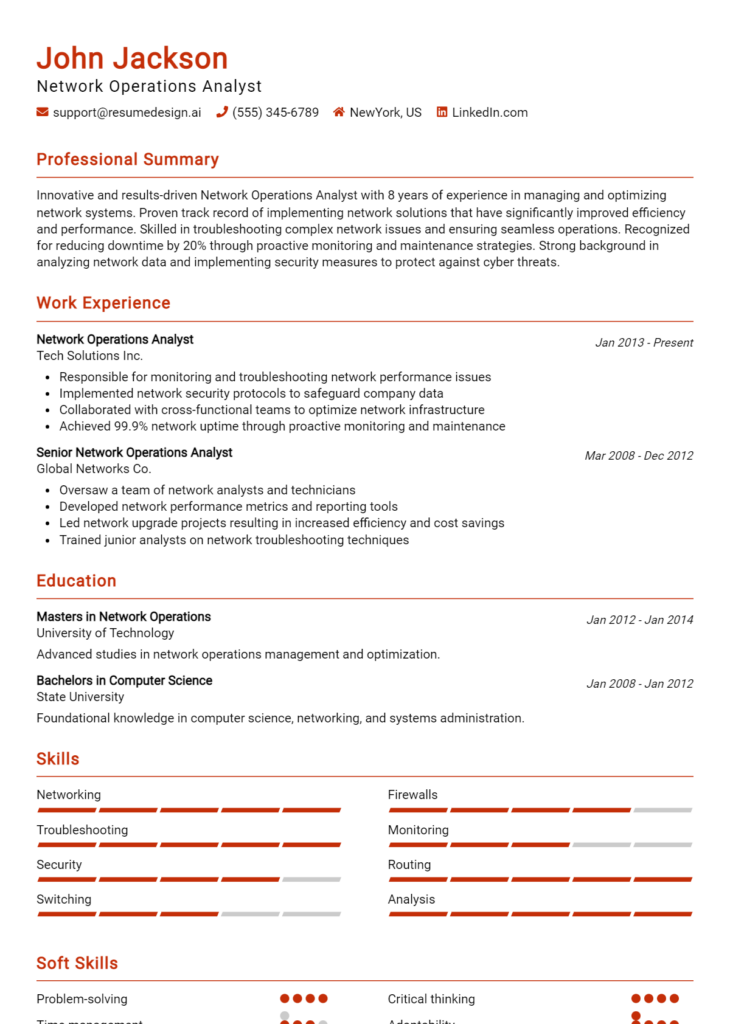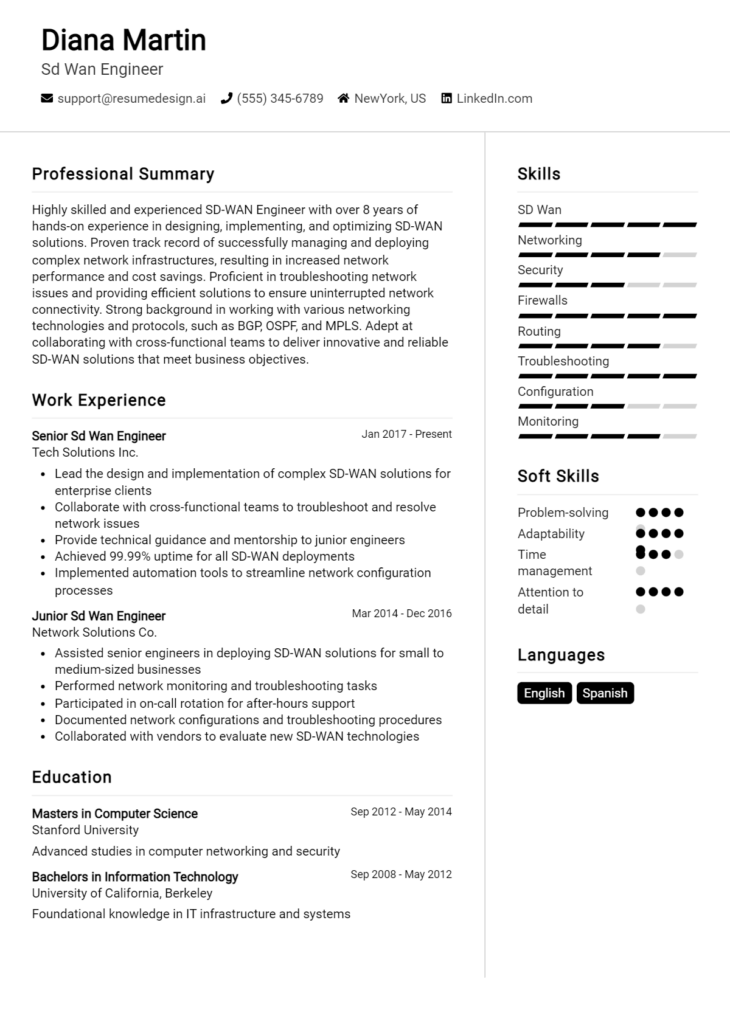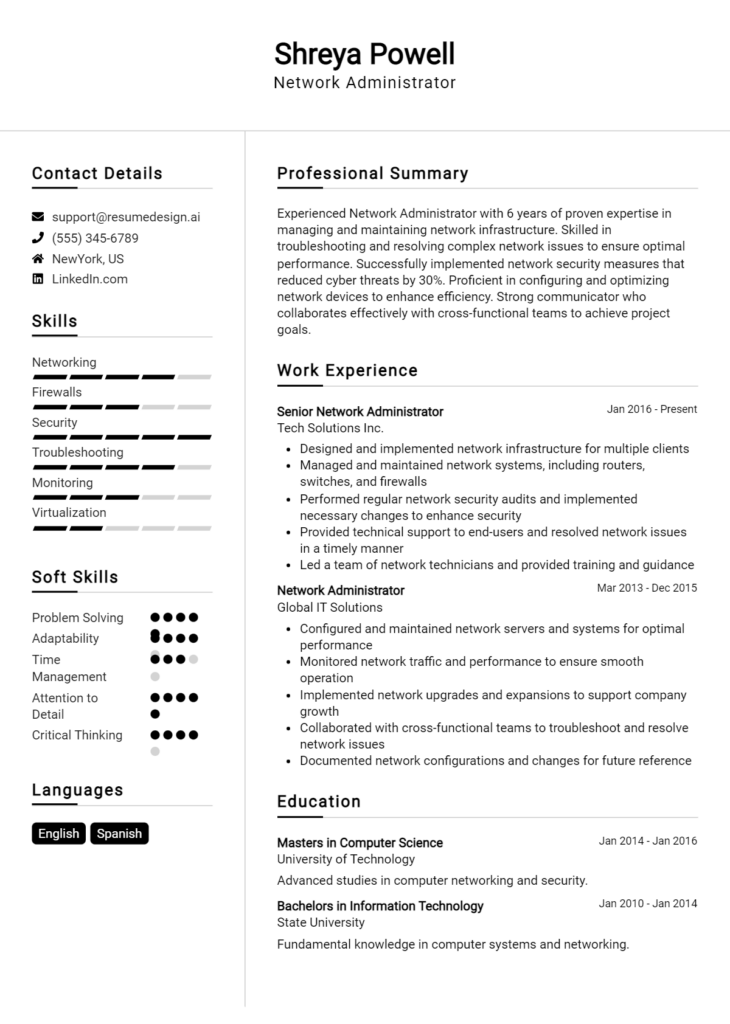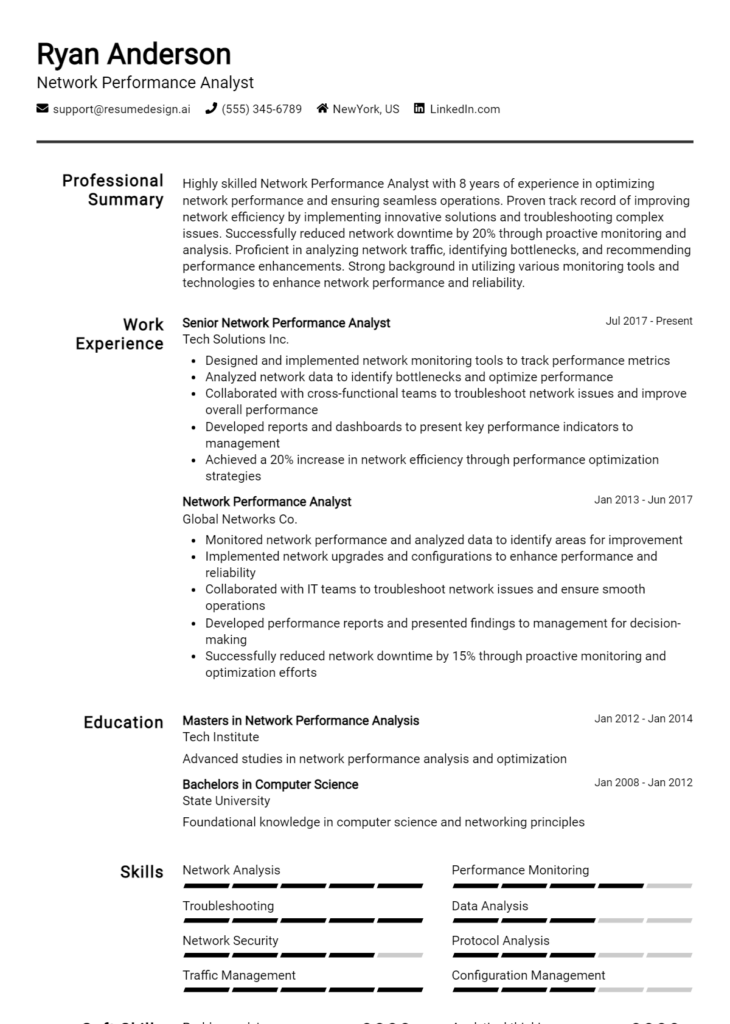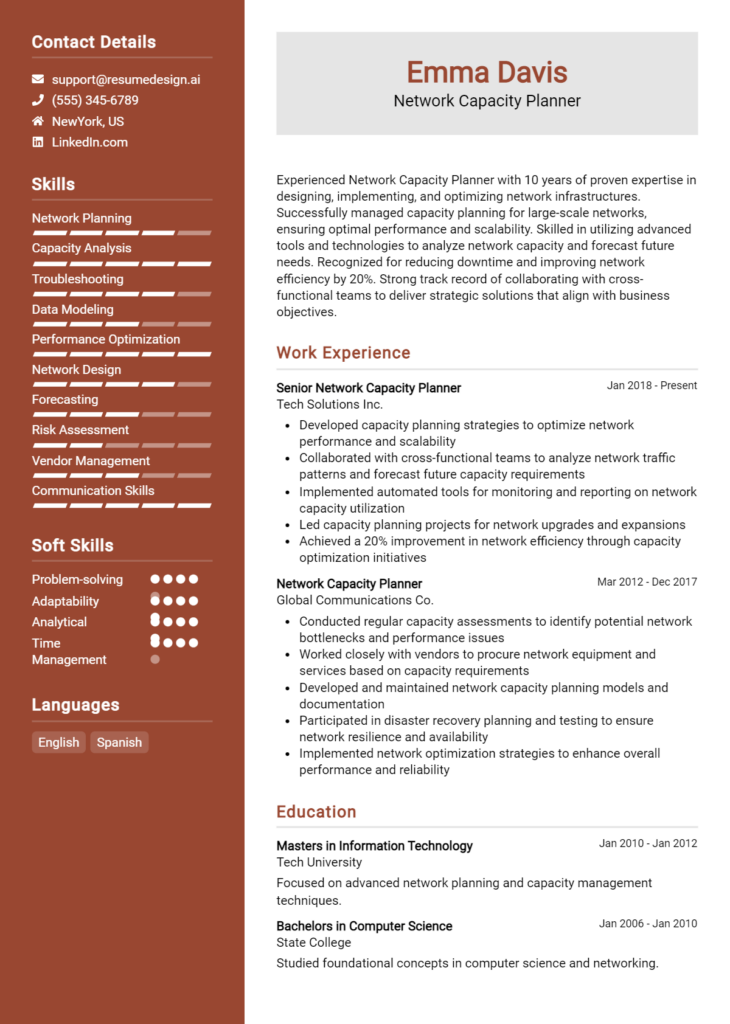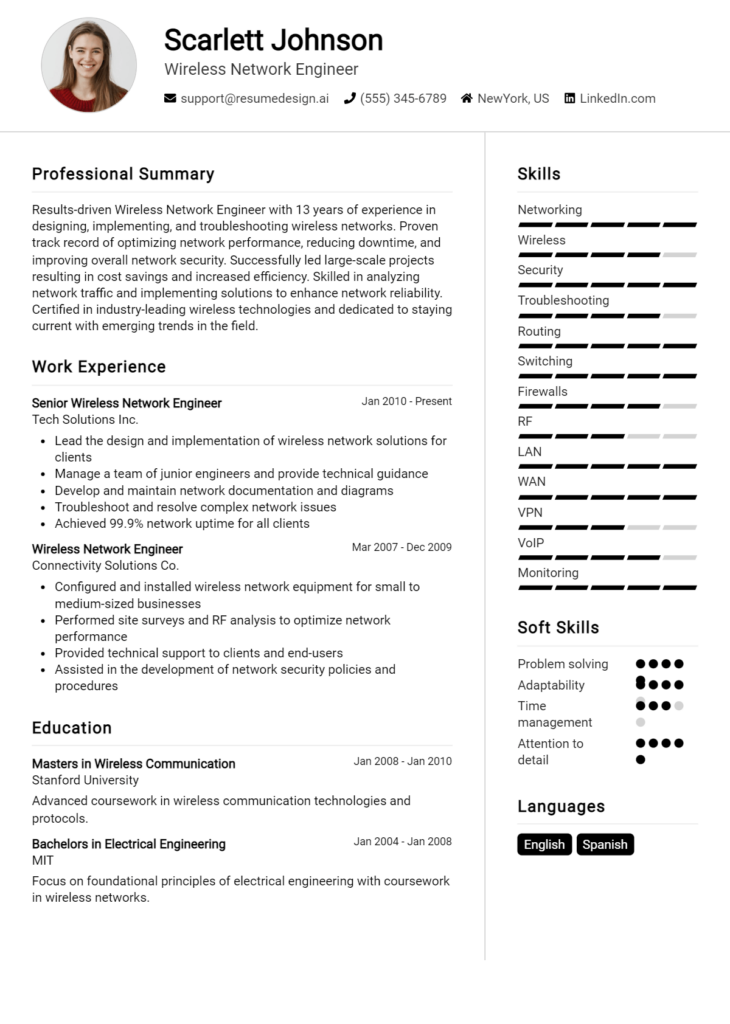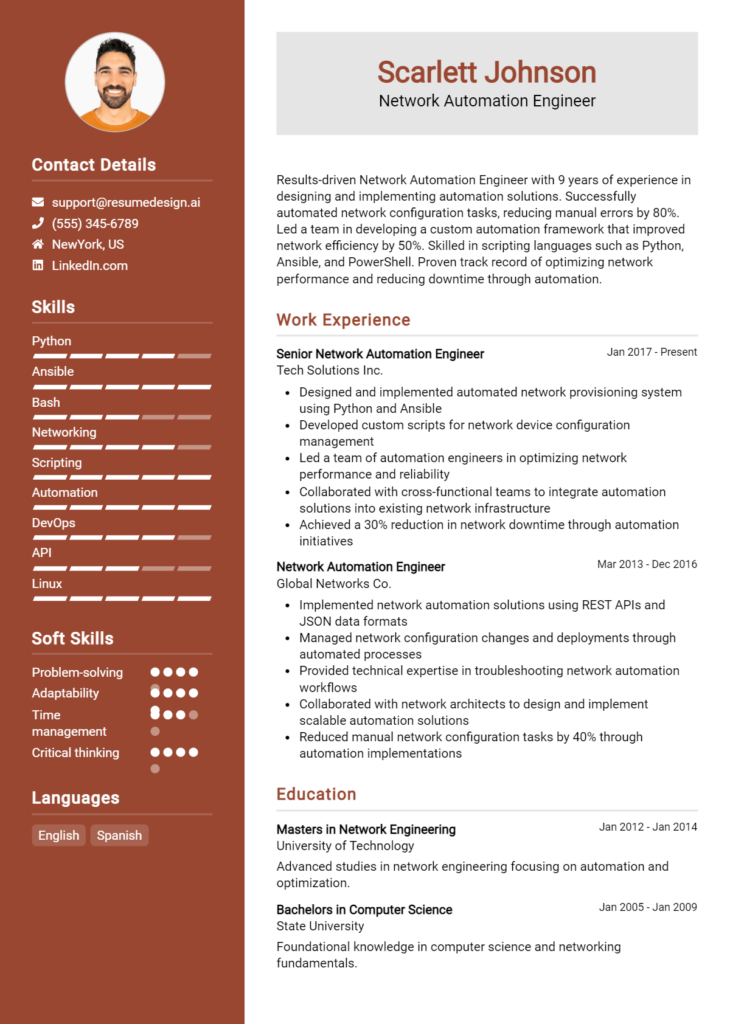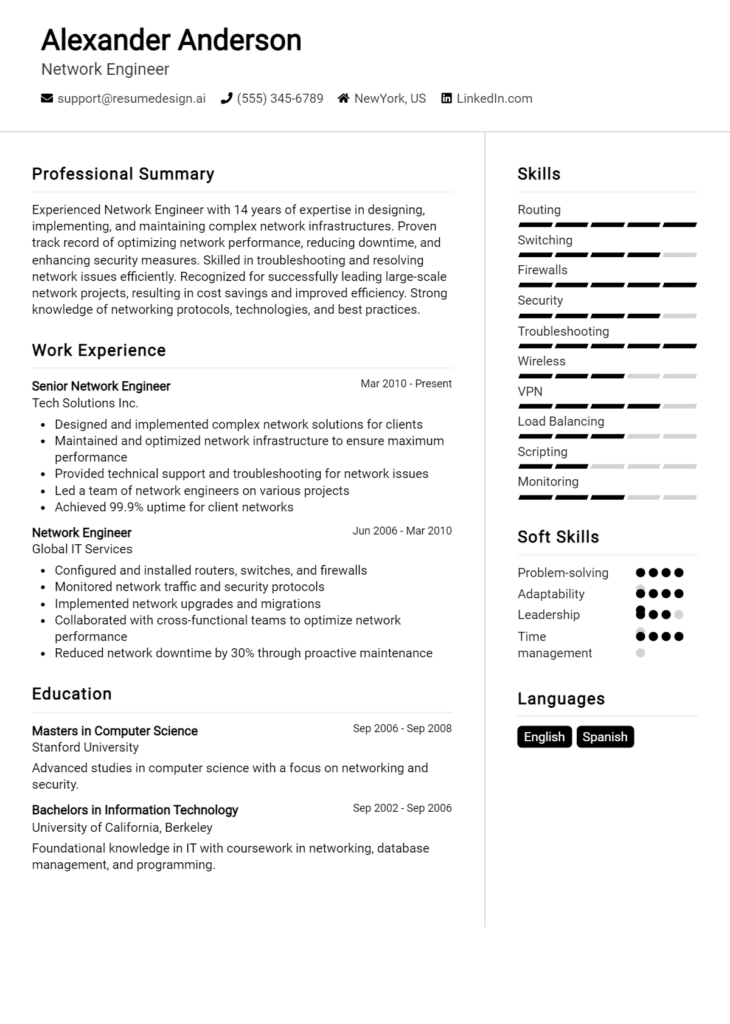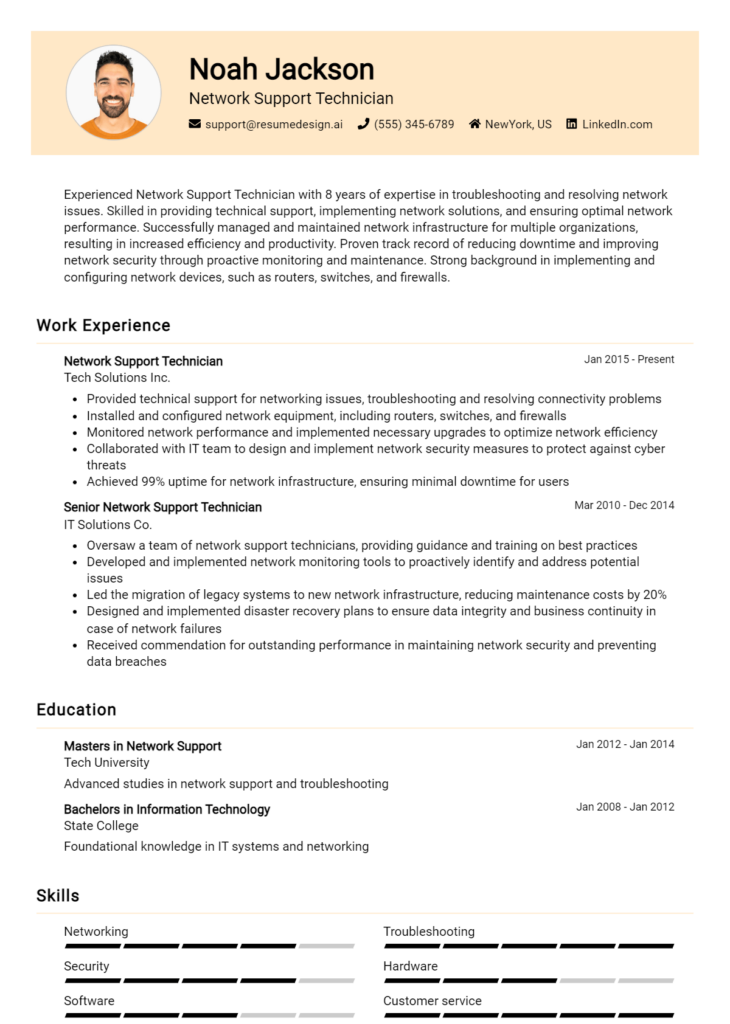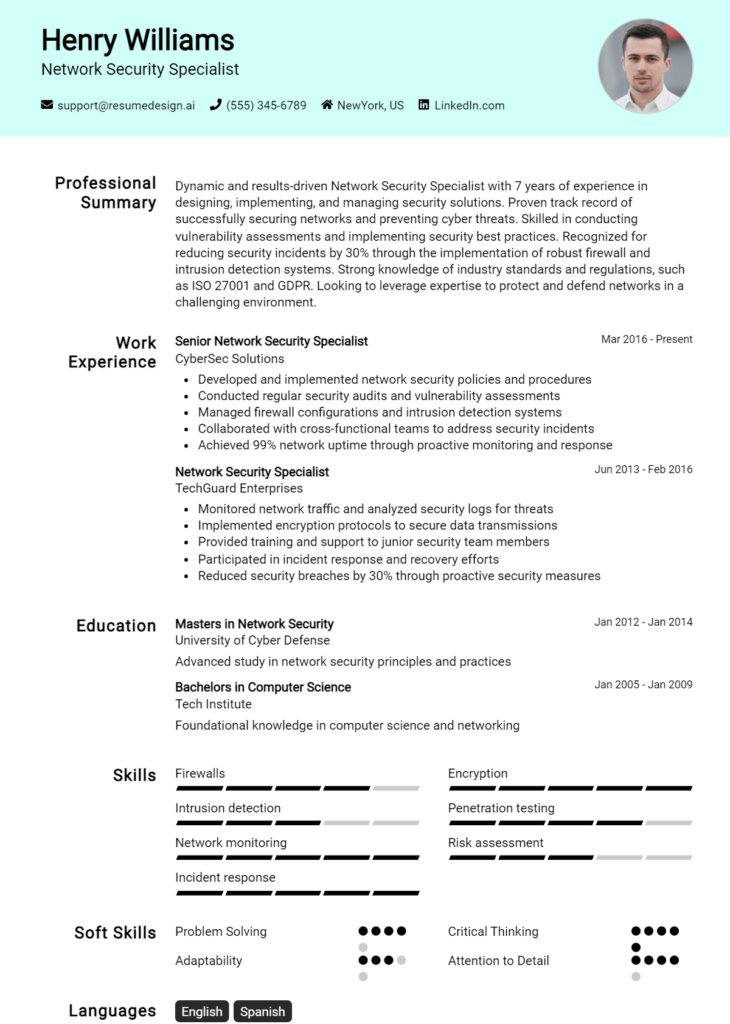Network Forensics Analyst Core Responsibilities
A Network Forensics Analyst plays a vital role in safeguarding an organization's digital assets by investigating and analyzing network traffic to identify security breaches or malicious activity. This role requires a blend of technical expertise, operational insight, and strong problem-solving abilities, enabling collaboration across IT, security, and compliance departments. Proficiency in network protocols, forensic tools, and analytical methodologies is essential for success. A well-structured resume effectively highlights these skills, showcasing a candidate's ability to contribute to the organization's overarching security objectives.
Common Responsibilities Listed on Network Forensics Analyst Resume
- Analyze network traffic data to identify anomalies and potential security threats.
- Conduct forensic investigations on security incidents to determine the root cause.
- Collaborate with IT and security teams to implement preventive measures.
- Utilize forensic tools and software to collect and preserve evidence.
- Create detailed reports on findings and recommendations for stakeholders.
- Monitor network activity for signs of unauthorized access or breaches.
- Stay updated on the latest cybersecurity trends and threats.
- Assist in developing and enforcing security policies and procedures.
- Provide training and awareness to staff on security best practices.
- Participate in incident response planning and execution.
- Document all investigative processes and maintain chain of custody.
High-Level Resume Tips for Network Forensics Analyst Professionals
A well-crafted resume is essential for Network Forensics Analyst professionals, as it often serves as the first impression a candidate makes on potential employers. In a competitive field where technical expertise and analytical skills are paramount, your resume must effectively showcase your qualifications, skills, and accomplishments. It should not only reflect your proficiency in network analysis and cyber threat detection but also convey your unique contributions to previous roles. This guide will provide practical and actionable resume tips specifically tailored for Network Forensics Analyst professionals, ensuring that you stand out in the eyes of hiring managers.
Top Resume Tips for Network Forensics Analyst Professionals
- Tailor your resume to match the job description by incorporating relevant keywords and phrases that align with the specific role.
- Highlight your hands-on experience with network protocols, forensic tools, and incident response methodologies.
- Quantify your achievements by including metrics such as the reduction of incident response time or successful identification of security breaches.
- Showcase any relevant certifications (e.g., CEH, CISSP, or GCFA) prominently to demonstrate your commitment to professional development.
- Include a summary statement at the top that encapsulates your expertise and what you bring to the table as a Network Forensics Analyst.
- Demonstrate your problem-solving skills by detailing specific challenges you encountered and how you overcame them in past roles.
- Utilize bullet points for clarity and conciseness, making it easy for hiring managers to scan your qualifications quickly.
- Incorporate industry-specific terminology to show familiarity with current trends and technologies in network forensics.
- Keep your resume to one or two pages, focusing on the most relevant and impactful information to maintain the reader's attention.
By implementing these tips, you can significantly enhance your resume, making it a powerful tool in your job search. A well-structured and tailored resume not only increases your chances of catching the eye of hiring managers but also positions you as a knowledgeable and capable candidate in the Network Forensics Analyst field.
Why Resume Headlines & Titles are Important for Network Forensics Analyst
In the competitive field of network forensics, a well-crafted resume headline or title can serve as a powerful tool to capture the attention of hiring managers. For a Network Forensics Analyst, the headline is not just a formality; it's a crucial element that summarizes a candidate's key qualifications and unique selling points in one impactful phrase. A strong headline should be concise and relevant, directly reflecting the job being applied for, thus allowing candidates to make a strong first impression in a matter of seconds. By highlighting essential skills or experiences, an effective headline can quickly convey the applicant's value, setting the stage for the rest of the resume.
Best Practices for Crafting Resume Headlines for Network Forensics Analyst
- Keep it concise: Aim for a headline that is brief yet informative, ideally one to two lines long.
- Be specific: Use terminology that is specific to the network forensics field to demonstrate expertise.
- Highlight key skills: Include relevant technical skills or certifications that distinguish you from other candidates.
- Tailor for the role: Customize the headline to match the specific job description and requirements.
- Use action-oriented language: Choose dynamic verbs and impactful phrases to convey your strengths.
- Showcase accomplishments: If applicable, include quantifiable achievements or recognitions to add credibility.
- Avoid jargon: While technical terms are important, avoid overly complex language that may confuse the reader.
- Maintain professionalism: Ensure the tone remains formal and aligned with the expectations of the industry.
Example Resume Headlines for Network Forensics Analyst
Strong Resume Headlines
Certified Network Forensics Analyst with 5+ Years of Experience in Cybersecurity Investigations
Expert in Network Traffic Analysis and Cyber Threat Detection with Proven Results
Skilled Network Forensics Specialist with a Track Record of Successful Incident Response
Weak Resume Headlines
Network Analyst
Experienced Professional Seeking Opportunities
Strong headlines are effective because they are clear, specific, and directly communicate the candidate’s strengths and expertise in network forensics, making them stand out in a crowded job market. In contrast, weak headlines fail to impress as they lack specificity and do not convey any unique qualifications or achievements, making it difficult for hiring managers to see the value the candidate could bring to their organization.
Writing an Exceptional Network Forensics Analyst Resume Summary
A well-crafted resume summary is essential for a Network Forensics Analyst as it serves as the first impression for hiring managers. This brief yet powerful section quickly highlights the candidate's relevant skills, experience, and accomplishments, making it easier for recruiters to assess suitability for the role. An impactful summary not only captures attention but also aligns the candidate's qualifications with the specific requirements of the job, increasing the likelihood of being selected for an interview. To achieve this, the summary should be concise, compelling, and tailored specifically to the position being applied for.
Best Practices for Writing a Network Forensics Analyst Resume Summary
- Quantify achievements: Use numbers and metrics to demonstrate the impact of your work.
- Focus on key skills: Highlight skills that are directly relevant to the role, such as network analysis, incident response, and data recovery.
- Tailor the summary: Customize the summary to reflect the specific job description and requirements.
- Be concise: Keep the summary brief, ideally between 3-5 sentences, to maintain the reader's attention.
- Use action verbs: Start sentences with strong action verbs to convey a sense of proactivity and competence.
- Highlight relevant experience: Mention specific experiences that relate to network forensics and any relevant certifications.
- Showcase problem-solving skills: Emphasize your ability to identify and solve complex issues in network security.
- Maintain a professional tone: Use a formal yet engaging writing style appropriate for the field.
Example Network Forensics Analyst Resume Summaries
Strong Resume Summaries
Detail-oriented Network Forensics Analyst with over 5 years of experience in investigating cyber incidents and analyzing network traffic. Successfully reduced incident response time by 30% through the implementation of advanced detection techniques, leading to enhanced organizational security.
Results-driven professional with expertise in network forensics and data recovery. Achieved a 40% improvement in threat detection accuracy by developing and deploying custom monitoring solutions. Certified in CEH and CISSP, with a proven ability to collaborate effectively with cross-functional teams.
Skilled Network Forensics Analyst with a solid background in incident response and malware analysis. Played a pivotal role in a significant security breach investigation, resulting in the recovery of 95% of compromised data and the development of a robust incident response plan.
Weak Resume Summaries
Experienced IT professional looking for a position in network forensics. I have knowledge of various security tools and am eager to learn more.
Network analyst with some experience in cyber security. I am a fast learner and hope to contribute to the team.
The examples of strong resume summaries are considered effective because they provide specific details about quantifiable results, relevant skills, and direct connections to the Network Forensics Analyst role. They demonstrate the candidate's impact and expertise in a clear and concise manner. In contrast, the weak summaries lack specificity and depth, failing to convey the candidate's qualifications or achievements, making them less appealing to hiring managers.
Work Experience Section for Network Forensics Analyst Resume
The work experience section of a Network Forensics Analyst resume is vital as it serves as a comprehensive showcase of the candidate’s technical skills, leadership capabilities, and ability to deliver high-quality results. This section not only highlights specific experiences but also allows candidates to demonstrate their expertise in network analysis, incident response, and data recovery. By quantifying achievements and aligning their experiences with industry standards, candidates can effectively communicate their value to potential employers, making a compelling case for their fit in a highly technical role.
Best Practices for Network Forensics Analyst Work Experience
- Use clear and specific language to describe technical skills and tools utilized.
- Quantify achievements with metrics such as percentage improvements, time saved, or incidents resolved.
- Highlight collaboration with cross-functional teams to demonstrate teamwork and communication skills.
- Emphasize leadership roles taken in projects or initiatives.
- Tailor experiences to align with the job description and industry standards.
- Include relevant certifications or training that complement work experience.
- Showcase problem-solving skills with examples of challenges faced and solutions implemented.
- Keep descriptions concise while ensuring they convey the impact of your contributions.
Example Work Experiences for Network Forensics Analyst
Strong Experiences
- Led a team of 5 analysts in a comprehensive investigation that identified and mitigated a security breach, resulting in a 30% reduction in incident response time.
- Developed and implemented a new network monitoring protocol that improved threat detection accuracy by 40%, enhancing overall network security.
- Collaborated with IT and legal departments to execute an incident response plan, successfully restoring services within 24 hours and minimizing downtime by 50%.
- Conducted over 100 forensic investigations, providing detailed reports that informed executive decision-making and reduced future vulnerabilities by 25%.
Weak Experiences
- Worked on network security issues.
- Assisted in analyzing data.
- Participated in team meetings regarding incidents.
- Helped maintain network systems.
The examples categorized as strong experiences are considered effective because they provide specific, quantifiable outcomes and demonstrate leadership and collaboration, showcasing the candidate's ability to deliver significant results in a professional setting. Conversely, the weak experiences lack detail and measurable impact, making it difficult for potential employers to assess the candidate's true capabilities and contributions. This emphasizes the importance of articulating experiences clearly and compellingly in the resume.
Education and Certifications Section for Network Forensics Analyst Resume
The education and certifications section of a Network Forensics Analyst resume is crucial as it provides a comprehensive overview of the candidate's academic background and professional qualifications. This section not only showcases the foundational knowledge essential for roles in network security and forensics but also highlights industry-relevant certifications that demonstrate a commitment to continuous learning and professional development. By including relevant coursework, specialized training, and recognized credentials, candidates can significantly enhance their credibility and align their skills with the specific requirements of the job, making them more appealing to potential employers.
Best Practices for Network Forensics Analyst Education and Certifications
- Focus on relevant degrees in computer science, information technology, or cybersecurity.
- Highlight industry-recognized certifications such as Certified Information Systems Security Professional (CISSP) or Certified Ethical Hacker (CEH).
- Include specialized training programs related to network forensics and incident response.
- Provide details on relevant coursework that demonstrates knowledge in network protocols, security frameworks, and forensic analysis.
- List certifications in order of relevance and recency to emphasize current expertise.
- Consider including online courses or workshops that showcase ongoing skills development.
- Clearly indicate the institution and date of completion for each qualification.
- Be specific about any hands-on projects or practical experiences gained during coursework or training.
Example Education and Certifications for Network Forensics Analyst
Strong Examples
- B.S. in Computer Science, XYZ University, Graduated May 2021
- Certified Information Systems Security Professional (CISSP), Issued April 2022
- Network Forensics Certification, ABC Institute, Completed June 2023
- Relevant Coursework: Network Security, Digital Forensics, Cybersecurity Fundamentals
Weak Examples
- High School Diploma, 2015
- Certification in Microsoft Office, Completed March 2020
- Basic Computer Skills Course, Online Platform, 2019
- Associate’s Degree in General Studies, ABC Community College, 2018
The examples listed as strong are considered such because they directly pertain to the skills and knowledge necessary for a Network Forensics Analyst position, showcasing relevant degrees, certifications, and courses that align with industry standards. In contrast, the weak examples illustrate qualifications that are either outdated, not relevant to the field of network forensics, or do not demonstrate a strong foundation in cybersecurity, thereby diminishing the candidate's appeal to potential employers.
Top Skills & Keywords for Network Forensics Analyst Resume
As a Network Forensics Analyst, possessing the right skills is crucial for not only securing a position but also excelling in this dynamic field. Employers seek candidates who can effectively analyze network traffic, detect suspicious activities, and respond to incidents in a timely manner. A well-crafted resume that highlights both soft and hard skills can set you apart from other applicants. These skills not only demonstrate your technical proficiency but also showcase your ability to communicate effectively, work collaboratively, and adapt to evolving challenges in cybersecurity. For professionals in this role, a comprehensive understanding of skills and relevant work experience is essential to navigate the complexities of network forensics.
Top Hard & Soft Skills for Network Forensics Analyst
Soft Skills
- Attention to Detail
- Analytical Thinking
- Problem-Solving
- Effective Communication
- Team Collaboration
- Time Management
- Adaptability
- Critical Thinking
- Research Skills
- Ethics and Integrity
Hard Skills
- Network Protocols (TCP/IP, UDP, etc.)
- Packet Analysis Tools (Wireshark, tcpdump)
- Intrusion Detection Systems (IDS)
- Digital Forensics Techniques
- Log Analysis and Management
- Security Information and Event Management (SIEM)
- Malware Analysis
- Scripting and Programming Languages (Python, Bash)
- Vulnerability Assessment Tools
- Incident Response Planning
By emphasizing these critical skills in your resume, you can effectively convey your qualifications and readiness to tackle the challenges faced by a Network Forensics Analyst.
Stand Out with a Winning Network Forensics Analyst Cover Letter
I am writing to express my interest in the Network Forensics Analyst position at [Company Name], as advertised on [Job Board/Company's Career Page]. With a solid background in cybersecurity and network analysis, along with my passion for investigating and resolving security incidents, I am excited about the opportunity to contribute to your team. My experience in analyzing network traffic and identifying potential threats aligns well with the requirements of this role, and I am eager to bring my skills to [Company Name].
In my previous role as a Network Security Analyst at [Previous Company Name], I was responsible for monitoring network traffic for anomalies and conducting thorough forensic investigations to uncover the root causes of security breaches. I utilized advanced tools such as Wireshark, Snort, and various SIEM platforms to analyze data packets and identify suspicious behavior. My analytical mindset and attention to detail allowed me to develop and implement effective incident response strategies, which significantly reduced response times and improved overall network security posture. Furthermore, I collaborated with cross-functional teams to ensure that security policies were enforced and adhered to throughout the organization.
I am particularly drawn to [Company Name] because of your commitment to innovation and excellence in network security solutions. I admire your proactive approach to combating cyber threats and believe that my background in forensic analysis and threat detection would be a valuable addition to your team. I am excited about the possibility of contributing to your organization’s mission and helping to safeguard sensitive data from emerging threats.
Thank you for considering my application. I look forward to the opportunity to discuss my qualifications further and explore how my expertise can benefit [Company Name]. I am eager to bring my passion for network forensics and commitment to enhancing cybersecurity measures to your esteemed organization.
Common Mistakes to Avoid in a Network Forensics Analyst Resume
When crafting a resume for a Network Forensics Analyst position, it's crucial to present your skills and experiences effectively to stand out in a competitive job market. However, many candidates make common mistakes that can undermine their chances of landing an interview. Here are some pitfalls to avoid when creating your resume:
Lack of Specificity: Using vague language can make your accomplishments unclear. Instead of saying "involved in network monitoring," specify your role and the tools you used, such as "monitored network traffic using Wireshark to identify potential threats."
Ignoring Relevant Certifications: Failing to highlight relevant certifications, such as Certified Information Systems Security Professional (CISSP) or Certified Ethical Hacker (CEH), can lead to missed opportunities. Clearly list all applicable certifications to emphasize your qualifications.
Overloading with Technical Jargon: While technical skills are essential, using excessive jargon can alienate hiring managers who may not be familiar with every term. Balance technical language with clear explanations of your skills and experiences.
Neglecting Soft Skills: Network forensics isn't just about technical ability; communication, problem-solving, and analytical skills are equally important. Make sure to include examples of how you've used these skills in your previous roles.
Poor Formatting: A cluttered or hard-to-read resume can detract from your qualifications. Use consistent formatting with clear headings and bullet points to enhance readability and professionalism.
Lack of Quantifiable Achievements: Stating your responsibilities without quantifying your achievements can make your impact less tangible. Use metrics to illustrate your contributions, like "reduced incident response time by 30% through efficient monitoring."
Inconsistent Employment Dates: Gaps or inconsistencies in employment dates can raise red flags for employers. Ensure that your work history is presented accurately and clearly to avoid any confusion.
Failing to Tailor the Resume: Sending out a generic resume for every application can dilute your chances. Tailor your resume to each job description, incorporating relevant keywords and experiences that align with the specific role.
Conclusion
As a Network Forensics Analyst, you play a crucial role in identifying, investigating, and mitigating cyber threats. Your expertise in analyzing network traffic, understanding protocols, and employing forensic tools is essential for safeguarding an organization’s digital assets. Throughout this article, we explored the core competencies required for this role, including knowledge of network architecture, proficiency with forensic tools, and analytical skills necessary to discern patterns indicative of malicious activity.
Additionally, we highlighted the importance of staying updated with the latest trends in cybersecurity and forensics methodologies, as the landscape is continuously evolving. By honing your skills and ensuring that your knowledge is current, you can position yourself as a valuable asset to any team.
Now, it's time to focus on your career progression. An effective resume is instrumental in showcasing your skills and experience to potential employers. We encourage you to review your Network Forensics Analyst resume, ensuring that it reflects your qualifications comprehensively and professionally.
Take advantage of the multitude of resources available to you, such as resume templates, which can provide you with a solid foundation. You might also consider using a resume builder for an easy and efficient way to create a polished document. For inspiration, check out the resume examples tailored for your field. Don’t forget to enhance your application with a compelling cover letter using our cover letter templates.
Invest the time to refine your resume today, and take the next step towards advancing your career as a Network Forensics Analyst!

